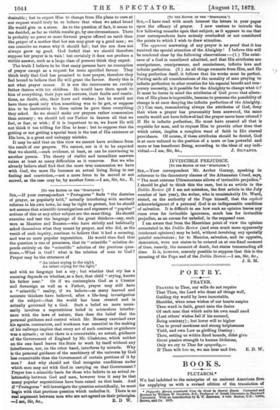(TO TIM EDITOR OF THB "SPECTATOR:1
Sin,—If your correspondent " Protagoras " finds "the doctrine of prayer, as popularly held," actually interfering with sanitary reforms in his own town, he may be right to protest, but he should not assume that scientific investigations and exposure of "popular" notions of this or any other subject are the same thing. He should examine and test the language of the great thinkers—say, such men as Maurice and Bunsen—who have strictly and habitually asked themselves what they meant by prayer, and who did, as the result of such inquiry, continue to believe that it had a meaning, and was no mere popular superstition. He would then find that the question is one of pretnisses, that its scientific " solution de- pends entirely on the "scientific" solution of the previous ques- tions,—What is God? what is the relation of man to God ? Prayer may be the utterance of
"An infant crying in the night,
An infant crying for the light,"
and with no language but a cry ; but whether that cry has a meaning depends on whether, as a fact, that child "crying, knows
his father near." Or if we contemplate God as a Creator and Sovereign as well as a Father, prayer may still have a " scientific " reality, if we believe—as many learned and accurate thinkers have believed, after a life-long investigation of the subject—that the world has been created and is actually governed by a God. Such a belief no more neces- sarily involves a superstitious belief in miraculous interfer- ence with the laws of nature, than does the belief that the personal guidance and control which Mr. Brassey exercised over his agents, contractors, and workmen was essential to the making of his railways implies that every act of such contract or guidance was a miracle ; or that there is a conceivable, an actual, guidance of the Government of England by Mr. Gladstone, which neither on the one hand leaves the State to work by itself without any interference, nor, on the other hand, interferes by miracle. ‘Vhy is the personal guidance of the machinery of the universe by God leas conceivable than the Government of certain portions of it by men ? And why should not God recognize conditions under which men may act with God in carrying on that Government ? Prayer has a scientific basis for those who believe in an actual re- lationship between God and man, however true it may be that many popular superstitions have been raised on that basis. And if "Protagoras " will investigate the question scientifically, he must begin with that previous question which underlies it. There is no real argument between men who are not agreed on their principles.


































 Previous page
Previous page